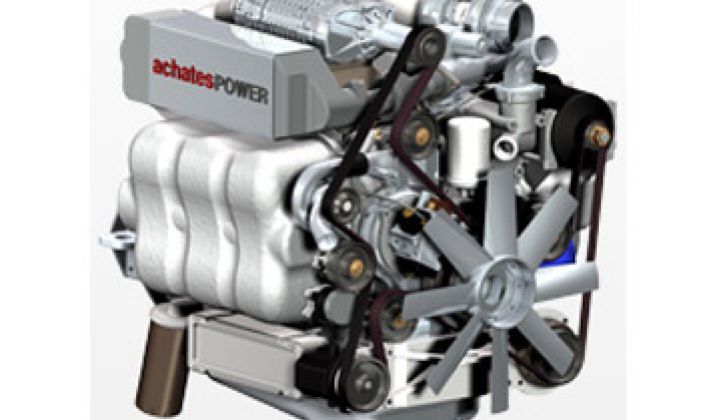It’s not every day that you meet a green tech company setting out to champion an idea last popular during the Third Reich.
Achates Power, however, claims that its proposed two-stroke opposed piston diesel engine -- an idea put into practice by the Junkers aircraft company -- will cost 10 percent to 15 percent less than a conventional engine to manufacture and will increase fuel efficiency by 10 percent to 15 percent, according to CEO David Johnson.
Right now, the company only has a single piston prototype but is in discussions with mainstream manufacturers of diesel engines. Ideally, engines based around Achates’ design could hit the market in 2015 or 2016.
“We’ve mitigated 95 percent of the technology risks” associated with the basic concept, said Johnson, who has been working on diesel engines since graduating from Cornell decades ago.
Applying the technology to actual engines, of course, will give birth to a new level of challenges. Still, it is not like truck manufacturers or trucking companies have a choice, he argues. The U.S. is on the verge of establishing mileage regulations for long-haul trucks that will increase fuel economy by around 20 percent. Today, trucks must meet emissions regulations, but the mileage standards are new.
Trucks on average only get around five to six miles a gallon, he said. In the U.S., trucks constitute 5 percent of the total number of vehicles but consume 25 percent of the fuel. Even at $3 a gallon, operating trucks isn’t cheap. In China, trucks constitute 25 percent of the vehicles and consume two-thirds of the fuel.
Several options exist for boosting mileage, but most are costly. Shifting from a classic diesel to a diesel hybrid adds about $25,000. Changing materials to lower a truck’s weight or increasing aerodynamics can run $12,000 to $23,000.
Achates says it will lower the total manufacturing cost because of the design of its engine, as it requires fewer components. In a conventional engine, each piston comes in its own cylinder topped by a cylinder head. Fuel gets combusted as the space between the piston and cylinder head is squeezed.
“The cylinder head is one of the most stressed parts of an engine,” he said.
In the Achates engine, two cylinders in the same cylinder charge toward each other and serve as the de facto cylinder head for the other. Removing the cylinder heads (along with valves and other components) improves performance and lowers costs.
“Your combustion chamber is two working surfaces,” he says. (Subaru and Porsche have boxer engines, which sport pistons positioned opposite from each other, but the pistons sit in their own cylinders. Another startup -- EcoMotors -- has an opposed piston/opposed cylinder engine that owes its heritage to Junkers, too.)
Performance is further enhanced by the fact that the combustion cycle now only takes two, rather than four, phases.
Do doubts exist? You bet. Reliability, durability, oil consumption and other issues have lingered about opposed piston engines. Car companies historically have also tended be conservative and wary about outside technology. Back in early 2009, Achates said it had hoped to have its first deal signed in 2010 and it's now 2011.
In new, emerging markets, Achates may become a partner in engine joint ventures, but for the immediate future, it hopes to license its technology to others.
While the technology could be used in cars, trucks or even stationary diesel generators, Achates will aim at trucks first because the economic and other circumstances happen to be best in that space. Another plus: the engine design further reduces NOx and SOx. Diesel sales are also escalating in autos, even in the the U.S., according to Audi.
“The existing engine plants can make our engine” with some retooling, he said.
The company was founded by James Lemke. Back in 1998, Lemke, a private pilot, wanted to find a better backup engine. The first investor was John Walton, the Walton family member who supported First Solar through its years in development. Sequoia Capital, the reluctant green VC, has also invested.
Historical note: the Junkers Jumo 205 was one in a series of opposed piston diesel engines the company built for aircraft in the 1930s. While gaining high marks for efficiency, combat was not their forte.
The name Achates comes from the Aeneid. Achates was Aeneas’ friend, but he didn’t say much. Despite his blah outing in the epic, the British navy named a lot of ships after him.



